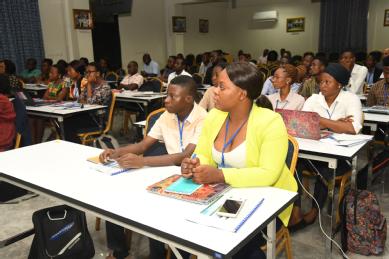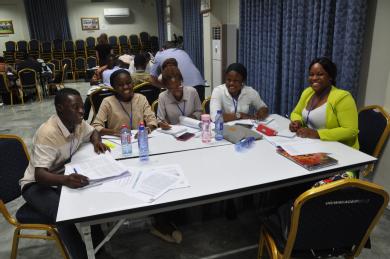Warwick expertise supports developing biomedicine talent in Africa
· Scientist from University of Warwick involved in international project to ‘upskill’ aspiring bioscientists in Africa
· Around 40 students took part in a research tools course at the University of Accra
· Dr Samuel Dean from Warwick Medical brought expertise in the parasitic cells trypanosomes
 A University of Warwick scientist is spearheading efforts to ‘upskill’ some of Africa’s brightest up-and-coming bioscientists.
A University of Warwick scientist is spearheading efforts to ‘upskill’ some of Africa’s brightest up-and-coming bioscientists.
Dr Samuel Dean from Warwick Medical School is one of a group of scientists from UK universities spearheading a course in Ghana to provide talented students with access to bioscience researchers at the cutting-edge of their fields, as well as professional development support.
The week-long course is held at the University of Accra in Ghana each January as part of an ongoing project funded by the Wellcome Trust. Now in its fourth year, the course sees researchers from across the globe teach molecular tools at the West African Centre for Cell Biology and Infectious Pathogen Research (WACCBIP).
This year, Dr Dean contributed to the course with his background in trypanosomes, a single-celled organism that causes African Sleeping Sickness and Chagas disease. His research focuses on the role of the flagellum, a long appendage that extends from nearly all cell types, in cell movement and parasite behaviour. Trypanosomes are powerful tools to study flagella as they are one of the most tractable model systems in which to investigate biology. Knowledge gained from studying the trypanosome flagellum may help understand human genetic diseases of the flagellum.
 He said: “We teach around 40 students from all over Africa fundamental biology and also skills and research tools to help them with their projects. Their MSc/PhD course is highly competitive to get onto and funded by the World Bank and the Wellcome Trust.”
He said: “We teach around 40 students from all over Africa fundamental biology and also skills and research tools to help them with their projects. Their MSc/PhD course is highly competitive to get onto and funded by the World Bank and the Wellcome Trust.”
The course is divided into three parts that runs over five or seven days, including science lectures on topics such as bacteria, viruses, trypanosomes and plasmodium; workshops on research skills, scientific software and use of database resources; and professional development sessions.
 The students also work in groups to give a presentation at the end of the course on a particular subject. Topics this year included understanding drug action and resistance through genome-wide analyses, progress towards an effective malaria vaccine, disease eradication initiatives, and drug donation programs.
The students also work in groups to give a presentation at the end of the course on a particular subject. Topics this year included understanding drug action and resistance through genome-wide analyses, progress towards an effective malaria vaccine, disease eradication initiatives, and drug donation programs.
Dr Dean adds: “By ‘upskilling’ the students, we will help them have a more successful MSc/PhD project and the soft skills that we promote will help them be better scientists. Ultimately, we hope that this will benefit their career, whether it will be in or out of science.
“We adapt the course according to the changing demands of the students every year. I suspect this will mean that the course becomes more diverse and incorporates elements of genetic diseases, microbiomes, and other emerging areas.”
WACCBIP was founded in 2014 with funding from the World Bank. The postgraduate courses are highly selective with a range of students from different parts of Africa, and the students are some of the brightest and most enthusiastic.
The scope of the institute is non-communicable disease (NCD), genetic disease and parasite disease. They are an African Centre for Excellence (ACE) and have a Wellcome Trust DELTA’s programme. Around ten of their research groups focus on trypanosome and plasmodium research.
Ends
Notes to editors:
Images from the course are available to download via the links below:
Students on the course at the West African Centre for Cell Biology and Infectious Pathogen Research: https://warwick.ac.uk/services/communications/medialibrary/images/february2020/dsc_0321.jpg
Students on the course at the West African Centre for Cell Biology and Infectious Pathogen Research: https://warwick.ac.uk/services/communications/medialibrary/images/february2020/dsc_6350.jpg
Dr Samuel Dean with students at the West African Centre for Cell Biology and Infectious Pathogen Research: https://warwick.ac.uk/services/communications/medialibrary/images/february2020/dsc_0332.jpg
21 February 2020
For interviews contact:
Peter Thorley
Media Relations Manager (Warwick Medical School and Department of Physics)
Email: peter.thorley@warwick.ac.uk
Tel: +44 (0)24 761 50868
Mob: +44 (0) 7824 540863
